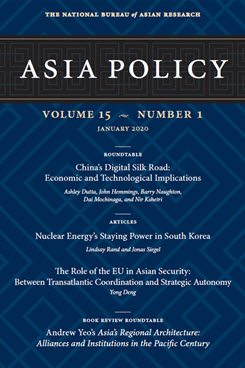China’s Emergence as the Global Fintech Capital and Implications for Southeast Asia
This essay examines the current transformation of the Chinese financial sector and the implications of Chinese financial technology (fintech) development for countries in Southeast Asia.
EXECUTIVE SUMMARY
MAIN ARGUMENT
China is home to some of the world’s most innovative fintech companies. Chinese fintech companies have been successful in promoting financial inclusion and integration in their home country and are attempting to replicate this success in Southeast Asian markets. The rapid development of the Chinese fintech industry can be attributed to various factors, including a high degree of technological savvy among Chinese consumers, underdeveloped banking systems, a fintech-friendly regulatory environment, and China’s improving scientific and technological prowess. Chinese technology companies are also successfully exporting their programs and technology to Southeast Asia, where many markets have a comparable base for new financial technologies. Geographic proximity as well as ethnic and cultural connections between China and Southeast Asia are also major facilitators that can help Chinese fintech companies succeed in the region.
POLICY IMPLICATIONS
- Strict data privacy laws and regulations requiring control and scrutiny of inbound foreign investments prevent Chinese firms from engaging with Western and other advanced markets. Due to the absence of these constraints in Southeast Asian markets, China’s fintech firms are emerging as major competitors.
- Many Chinese fintech programs perform poorly with regard to security and privacy practices, which should be an issue of concern as they gain access to new markets.
- Chinese technology firms operating in Southeast Asia could be pressured by the Chinese government to carry out censorship. For example, WeChat, used for messaging, social media, and mobile payments, has been accused of censorship activities in Southeast Asia and other foreign markets.
- Western and other advanced economies such as Japan must make special efforts to bring institutional changes to Southeast Asian markets for fintech products, especially in the areas of data privacy, cybersecurity, and surveillance. There is a need for closer collaboration with like-minded governments on standards and consumer awareness of privacy and surveillance risks. If consumers understand such risks, they are more likely to prefer fintech services provided by Japanese and Western firms.
Nir Kshetri is Professor at the University of North Carolina–Greensboro and a Research Fellow at Kobe University in Japan. He has authored nine books and numerous academic articles and has provided consulting services to the Asian Development Bank and various agencies of the United Nations.
About Asia Policy
Asia Policy is a peer-reviewed scholarly journal presenting policy-relevant academic research on the Asia-Pacific that draws clear and concise conclusions useful to today’s policymakers. Asia Policy is published quarterly in January, April, July, and October and accepts submissions on a rolling basis. Learn more



